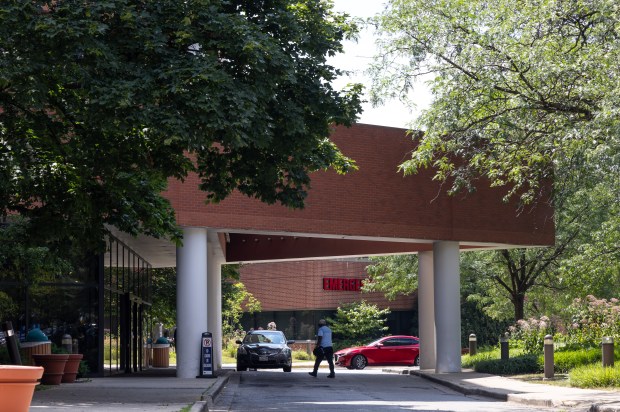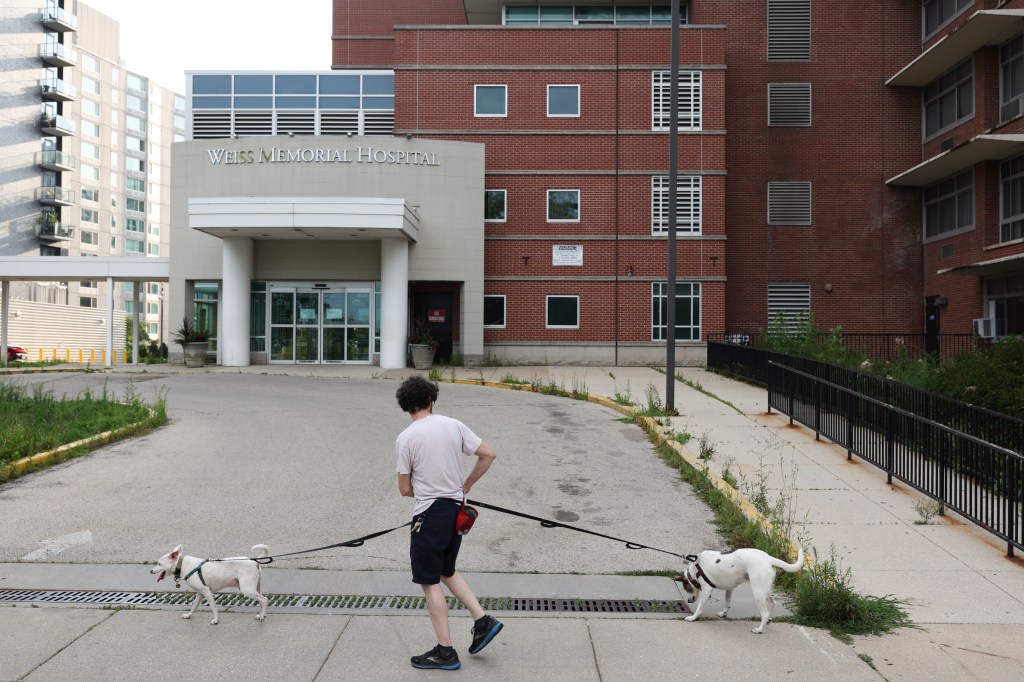The now-shuttered Weiss Memorial Hospital and its sister hospital West Suburban Medical Center owe more than $69 million in unpaid taxes and penalties to the state of Illinois, according to documents and information from the Illinois Department of Healthcare and Family Services.
Weiss owed $22.7 million in monthly payments and penalties to the state as of April 2025, and West Suburban owed about $34 million, according to letters from the state department to Dr. Manoj Prasad, whose company operates both hospitals. The Tribune obtained the letters through a Freedom of Information Act request.
Those numbers have since grown to $27.7 million owed by Weiss and $41.6 million owed by West Suburban, said Melissa Kula, a spokesperson for the Department of Healthcare and Family Services, in an email, in response to questions from the Tribune.
Attempts to reach Prasad for comment Tuesday and Wednesday were unsuccessful.
The revelation is the latest evidence of trouble at the two hospitals, which were bought by Prasad’s Resilience Healthcare in 2022. In August, the federal government terminated Weiss from the Medicare program because of safety issues identified by state investigators. The hospital, which relied heavily on Medicaid and Medicare dollars, then closed its doors, much to the dismay of local elected officials and community advocates who worry about patients’ access to care.
Weiss has since filed an appeal with the federal government of its termination from the Medicare program, said state Sen. Mike Simmons, D-Chicago, citing information he said he received from Sen. Tammy Duckworth’s office. Prasad previously said that although he hoped to reopen the hospital, the process could take a year or longer.
 West Suburban Medical Center in Oak Park, operated by Resilience Healthcare, is seen on Aug. 8, 2025. (Dominic Di Palermo/Chicago Tribune)
West Suburban Medical Center in Oak Park, operated by Resilience Healthcare, is seen on Aug. 8, 2025. (Dominic Di Palermo/Chicago Tribune)
West Suburban in Oak Park remains open, but Prasad warned at an August news conference that West Suburban could face a similar fate as Weiss, saying, “Any hospital can do that, I hate to say, with the environment that has changed.”
The documents obtained by the Tribune include 18 letters from DHFS to Weiss and West Suburban leaders, warning them that monthly hospital assessment payments had not been received and that late payment penalties had been added.
In Illinois, hospitals must pay a hospital assessment tax, which is collected by the Illinois Department of Healthcare and Family Services. The state uses that money to draw down additional federal matching dollars. Those combined funds are then distributed to hospitals in Illinois based on the number of services they provide to people on Medicaid in a given time frame.
Two April 2025 letters, addressed to Prasad, noted that, “The Department of Healthcare and Family Services (HFS) is committed to ensuring that hospitals meet their financial obligations to the State of Illinois and requires your cooperation in planning for repayment of this debt.” The letters note that the debt for both hospitals went back to September 2022 —– several months after the state Health Facilities and Services Review Board approved of the hospitals’ sale to Resilience but also several months before the deal actually closed.
The letters asked that the hospitals enter into repayment plans by Aug. 1, 2025, and warned that hospitals with outstanding tax debt that didn’t enter into agreements by that date would face financial penalties and “recoupment measures.”
Though both hospitals entered into repayment agreements, they’re not in compliance with those agreements, Kula said. The hospitals have not paid back any of the more than $69 million they owe, Kula said. The Illinois Department of Healthcare and Family Services is in the process of recouping funds from Weiss, and is “reviewing next steps” when it comes to West Suburban, she said.
Though it’s not unusual for safety net hospitals to struggle financially, the majority of Illinois’ safety net hospitals are not behind on their hospital assessment program payments, Kula said.
Ruth Castillo, a member of the Lakeside Area Neighbors Association, called the amount owed by Weiss and West Suburban “disappointing and shocking.”
Still, she said, she’s holding out hope that Weiss will reopen.
“It’s such an important resource for so many people in this area, not only as a health care provider, but it provides so many jobs to people in this area,” Castillo said.
Marc Kaplan, co-chair of Northside Action for Justice, said the unpaid taxes are “another reflection of what we think is a lack of commitment to maintain either hospital.” Kaplan’s group is part of a coalition of organizations hoping to save Weiss.
“It’s another big kind of alarm bell, so to speak, about what we’re faced with here,” Kaplan said.
Resilience, a for-profit company, bought the two hospitals in late 2022 from California-based Pipeline Health for $92 million. At the time, Resilience was a newly created company led by Prasad, who said his initial training was as a physician but who spent later years of his career working as a hospital leader and consultant. Prasad bought the hospitals with financial partner and business owner Reddy Rathnaker Patlola. The plan was for Patlola’s company Ramco Healthcare Holdings to own the land on which the hospitals sat, with Resilience entering into long-term lease agreements with Patlola. Patlola could not be reached for comment Wednesday.
Prasad said, at the time, that his first priority would be to stop the financial bleeding at the hospitals.
The hospitals’ previous owner, Pipeline, had also pledged to turn around the hospitals when it bought them from Tenet Healthcare in 2019 but quickly angered the community by closing a third Melrose Park hospital it bought as part of the same deal. In 2022, before selling Weiss and West Suburban, Pipeline filed for bankruptcy, and Weiss and West Suburban posted combined net losses of $69.7 million during the 12 months leading up to August 2022.
Prasad said during the August news conference that Weiss had been losing more than $30 million annually for several years when Resilience took it over. Together, Weiss and West Suburban had an $81 million debt to vendors, he said at the time.
Prasad said at the August news conference that Resilience had to cut certain services but continued to meet its payroll at Weiss. He said Weiss “hit a wall” in the spring because of problems with bill collections.
Weiss’ troubles peaked earlier this year when air conditioning equipment failed, prompting an investigation by the Illinois Department of Public Health. The state health department found temperatures as high as nearly 89 degrees in the hospital’s intensive care unit and nearly 87 degrees in the emergency department, according to an IDPH memo obtained through a Freedom of Information Act request.
Weiss moved all of its inpatients to West Suburban and other hospitals because of the heat.
The federal government said that in addition to the problems with the hospital’s “physical environment,” Weiss was also out of compliance with rules related to emergency services and nursing services, in its notice of the hospital’s termination from Medicare. The hospital has also lost its ability to get Medicaid dollars, in accordance with federal regulations and state law.
Weiss was slated to receive an additional $4 million in state dollars this year because of its status as a safety net hospital, but cannot receive that money while it’s terminated from Medicare and Medicaid, Simmons said.
Originally Published: October 16, 2025 at 5:00 AM CDT
